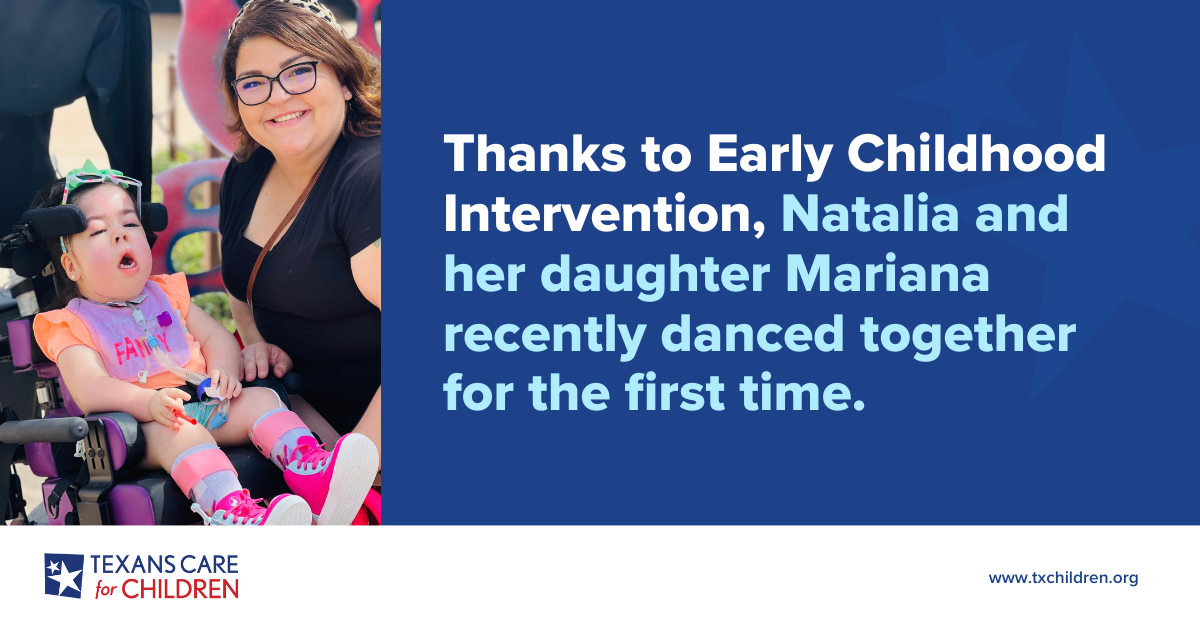
This commentary by Alec Mendoza, Senior Policy Associate for Health, originally appeared in the San Antonio Express-News on March 30, 2023.
During a routine checkup early in her pregnancy, Natalia Castillo found out her daughter was going to be born with abnormalities. But it wasn’t until Mariana was born that anyone knew the extent of the care she would need.
Mariana was born prematurely at 34 weeks. There were immediate complications. She needed tracheotomy surgery. For 135 days, the neonatal intensive care unit was her home. Mariana was eventually diagnosed with a rare neuromuscular genetic disorder. Finally, Natalia went home — carrying a precious new baby, a slew of home-care equipment, instructions for taking care of Mariana and the understanding that her life would never be the same.
Natalia was overwhelmed, but the local Texas Early Childhood Intervention, or ECI, provider, Any Baby Can, stepped in to help. A caseworker helped Natalia enroll Mariana in occupational therapy, physical therapy and speech therapy. With the caseworker coordinating everything, Natalia could focus on helping Mariana through her appointments and finding ways to support her daughter.
It also meant Natalia could enjoy simple, joyful moments with her daughter that she never thought she would have. Thanks to ECI, Natalia and Mariana danced together for the first time.
Mariana graduated from the ECI program in September 2022. Because of the critical services she received, she is in a better position to reach her full potential and enjoy being a kid.
The mission of the state’s ECI program is to ensure that all Texas infants and toddlers with disabilities and developmental delays get the services they need to reach their developmental goals. In addition to helping children learn to walk, communicate with their families, or reach other milestones, providing these therapies and support during the critical years before age 3 also cuts down on special education costs for our public schools. Unfortunately, chronic underfunding from the state has led to Texas kids like Mariana missing out on ECI.
Year after year, state funding per child falls below the Legislature’s stated target and below past funding levels, in part because the state continues to underestimate how many children will need these services. As a result, community organizations providing ECI services across Texas are being asked to serve more kids with less funding. They’ve had to cut back on outreach efforts, meaning some infants and toddlers who need ECI services either never enroll or they get a late start. The funding cuts also mean that children who do sign up for ECI may not get all the support they need.
Fortunately, the Legislature is taking notice. The House and Senate’s proposed state budgets include additional ECI funding requested by the Health and Human Services Commission, a good first step. The budget bills would provide $434 per enrolled child, an improvement from the current funding level, but far short of funding levels a decade ago.
However, to account for growing demand for ECI services among infants and toddlers, as well as the rising costs of services, the Legislature should go further and raise per-child funding to $504, the target set by the Legislature in 2009. Of course, the true gap between current funding and funding a decade ago is actually much larger if inflation is taken into account.
If state legislators are truly committed to supporting moms and babies this session, they should ensure our littlest Texans with disabilities and developmental delays have access to the same life-changing support provided to Natalia and Mariana.
Alec Mendoza is a senior policy associate for health at Texans Care for Children.



